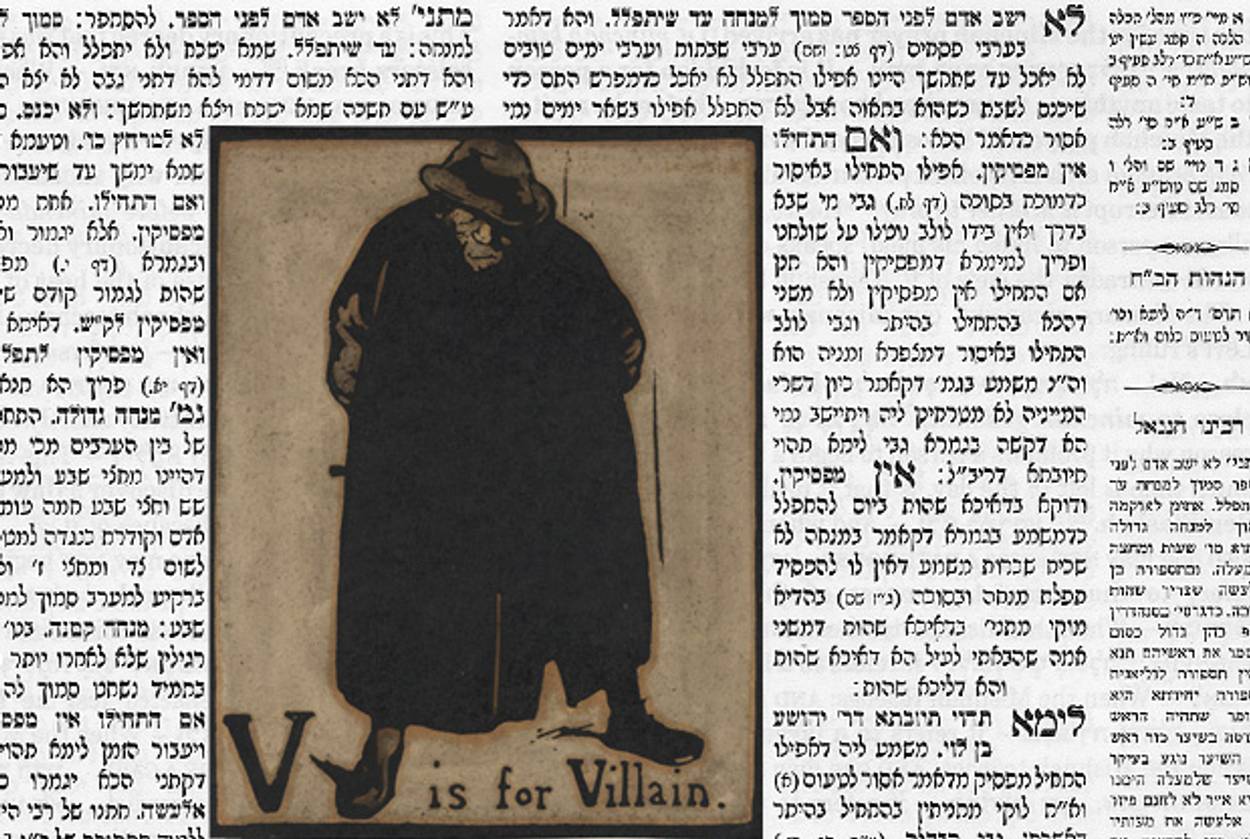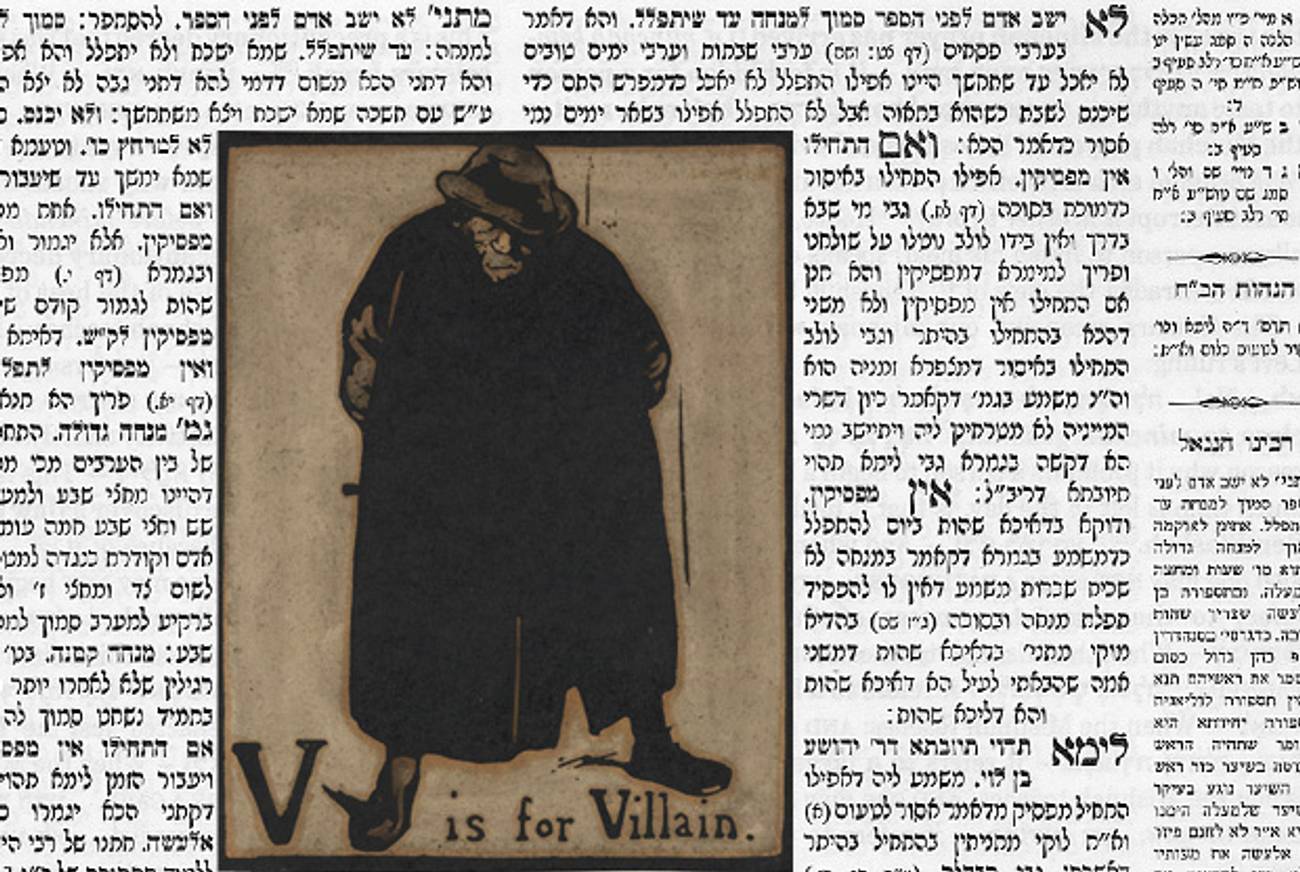The Badness of Good Stories
This week, Talmudic rabbis seek righteousness in the Bible’s tales of vice, weakness, and human frailty




Literary critic Adam Kirsch is reading a page of Talmud a day, along with Jews around the world.
It’s notoriously hard to write a good story about a good person. Goodness and wholeness are static, they do not need to change; and since narrative is nothing but a record of changes, it is no wonder that stories are almost always set off by mistakes, vices, weaknesses, or bad decisions.
No one knew this principle better than the writers of the Bible. Whatever the patriarchs and kings of the Israelites may be, they are not role models. On the contrary, it’s easy to be surprised by how candidly the Bible describes the flaws and sins even of the patriarchs and the greatest kings. Abraham pretends that his wife Sarah is his sister; Jacob tricks his blind father into giving him Esau’s blessing; Judah patronizes a prostitute; David lusts after Bathsheba and sends her husband to be killed in battle; Solomon, the builder of the Temple, spent his old age worshipping strange gods.
The Bible displays extraordinarily little anxiety about portraying its heroes in an unflattering light. Jacob can be both a liar and thief, and the man who wrestles with an angel and wins the name of Israel; David can be both the anointed of God and an adulterer. But as this week’s Daf Yomi reading showed, the rabbis of the Talmud were by no means at ease with this kind of ambiguity. In a long discussion that begins in Shabbat 55b, they consider some of the most famous sinners in the Bible and argue passionately that in fact none of them did what the Bible expressly says they did.
To see how the Talmud moves easily from abstract, technical problems to the largest moral questions, it’s helpful to start following the discussion a few pages earlier. Chapter Five of tractate Shabbat is mostly concerned with the kinds of things animals can and cannot carry on Shabbat. As we have seen earlier, it is forbidden on Shabbat to take any item from a private domain, such as a house, into a public domain, such as a road, or vice versa. The same thing applies to animals, which cannot carry loads on Shabbat.
But, the Mishnah asks in Shabbat 51b, does this ban include an animal’s normal equipment? “With what may an animal go out and with what may it not go out?” The answer, analyzed at length in the Gemara, is that animals are allowed to wear the kinds of things necessary for leading them, including collars, halters, and (for certain difficult species) nose rings; but they are not allowed to wear more elaborate gear. In the course of the discussion, the rabbis reveal a good deal about animal husbandry in Talmudic times, including the practice of tying up a ewe’s tail to facilitate breeding, and the use of certain kinds of wood as medicine for sheepworms.
One detail the Mishnah includes along the way is that “The cow of Elazar ben Azaryah used to go out with a strap between her horns, against the will of the Sages.” This raises two problems: first, why would a revered sage transgress Shabbat in this way; and second, why does the Mishnah say “the cow,” as if Elazar only had one, when in fact he was a very rich man who “used to tithe twelve thousand calves from his herd every year”? The answer, the Gemara reveals, is that it was not actually a cow belonging to Elazar that went out with a strap, but a cow that belonged to his neighbor. “However, because he did not protest against her, it was called his cow.”
Do human beings suffer and die for no reason, or is our suffering always a punishment for a sin?
From this minor episode, then, the rabbis deduce an important moral rule: the obligation to protest against transgressions committed by fellow Jews. “Whoever has the ability to protest against the members of his household but does not protest is punished for the transgressions of the members of his household”; and the same holds true for the transgressions of one’s town and of the entire world. All of us are responsible for one another, and we are judged not only as individuals but as members of a community. The Gemara goes on to analyze a passage from the Book of Ezekiel that suggests that God’s judgment will fall not just on the wicked but on righteous people who did not cry out against wickedness.
This naturally raises an even more ultimate question, perhaps the basic question of all theodicy. Do human beings suffer and die for no reason, or is our suffering always a punishment for some sin we have committed? Rav Ami has no doubt, stating sternly: “There is no death without transgression, and there is no suffering without sin.” It follows that, since all of us die, we have all committed at least some transgression; we are steeped in guilt and can no more avoid it than we can live forever.
It is perhaps to counter this harsh conclusion that other rabbis start to bring examples of men who were totally righteous, yet still had to die. Moses and Aaron, for instance: Did they not observe the entire Torah? No, the Gemara responds, even they sinned, when Moses impatiently struck the rock at Kadesh in order to make it produce water, thus failing to put his trust in God: “Had you believed in me,” God tells Moses, “your time to depart from the world would not have arrived.”
But according to a baraita, even if Moses and Aaron were justly punished, there were four men in the Bible who never sinned at all, but died solely “as a result of the serpent’s counsel”—that is, because Adam’s original sin introduced death into the world. These four are Benjamin the son of Jacob, Amram the father of Moses, Jesse the father of David, and Kilav the son of David. Their example, the Gemara decides, refutes Rav Ami: We can only conclude that “there is death without transgression and there is suffering without sin.”
It is now that the Talmud moves into the subject of biblical figures who are notorious sinners. Oddly, since even Moses and Aaron were said to be guilty in God’s eyes, the rabbis begin to argue that some of these much greater sinners were actually innocent of the deeds ascribed to them in the Bible. For instance, we read in Genesis 35:22, “While Israel [that is, Jacob] stayed in the land, Reuben went and lay with Bilhah, his father’s concubine, and Israel found out.” The punishment for this violation comes in Genesis 49:3, in Jacob’s final speech to his sons, where Reuben, the first-born, is harshly criticized and demoted from his proper place: “Unstable as water, you shall excel no longer;/ For when you mounted your father’s bed/ You brought disgrace.”
This seems plain enough. Yet “Rabbi Shmuel bar Nachmani said in the name of Rabbi Yonatan: Whoever says that Reuben sinned is simply mistaken.” Why? Because the end of Genesis 35:22 reads, “Now the sons of Jacob were 12 in number.” In this way, the rabbis argue, the Bible means to imply that Reuben was equal to his brothers, not their inferior. But then why does the Bible say, “Reuben went and lay with Bilhah?” Because this “teaches that Reuben disturbed his father’s bed, and Scripture regards him as if he lay with her.” And what did this “disturbing his father’s bed” consist of? Simply that Reuben moved his father’s bed out of Bilhah’s tent. Remember that Reuben was the son of Leah, Jacob’s unloved first wife, while Bilhah was the concubine given him by Rachel, his cherished second wife. By sleeping in Bilhah’s tent and avoiding Leah’s, Jacob was further insulting Leah; and it was to avenge this insult that Reuben, Leah’s son, moved Jacob’s bed into her tent.
This way of reading the Bible can’t help but appear highly unnatural. Effectively, the rabbis nullify what the Bible actually says—that Reuben slept with Bilhah—and replace it with a story entirely of their own invention. The questions I find myself struggling with are, first, why they wanted to read the Bible this way, and second, how they justified the unnaturalness to themselves. What is at stake in arguing that Reuben—and the other, greater figures who are the subjects of similar arguments, like David and Solomon—never committed a sin?
One possibility is that the rabbis cannot tolerate the Bible’s tolerance for sin and human frailty. They want to impose a standard of innocence and piety on the early Israelites that the Bible itself did not claim for them. This is perhaps related to the way the Talmud rewrites the martial feats of David’s soldiers by turning them into feats of Torah study. It as though the austere moral standards of rabbinic Judaism are being projected back onto an earlier phase of Jewish history, which did not share them.
As for the grounds the rabbis use to justify their rewriting of Reuben’s story, they seem quite frail. If the Bible wanted to say that Reuben did not commit a sin, why not say so, instead of encoding that message in the seemingly neutral phrase “the sons of Jacob were 12 in number?” It seems like bad hermeneutics to allow a speculative reading of the text to cancel out a plain reading. Yet it would be absurd to claim that the rabbis did not respect the text of the Torah when, in fact, they regarded it as the most important thing in the universe. Rather, it seems, they honored it by finding it in as many pious meanings as possible, even if that meant reading against the grain.
***
Like this article? Sign up for our Daily Digest to get Tablet Magazine’s new content in your inbox each morning.
Adam Kirsch is a poet and literary critic, whose books include The People and the Books: 18 Classics of Jewish Literature.
Adam Kirsch is a poet and literary critic, whose books include The People and the Books: 18 Classics of Jewish Literature.